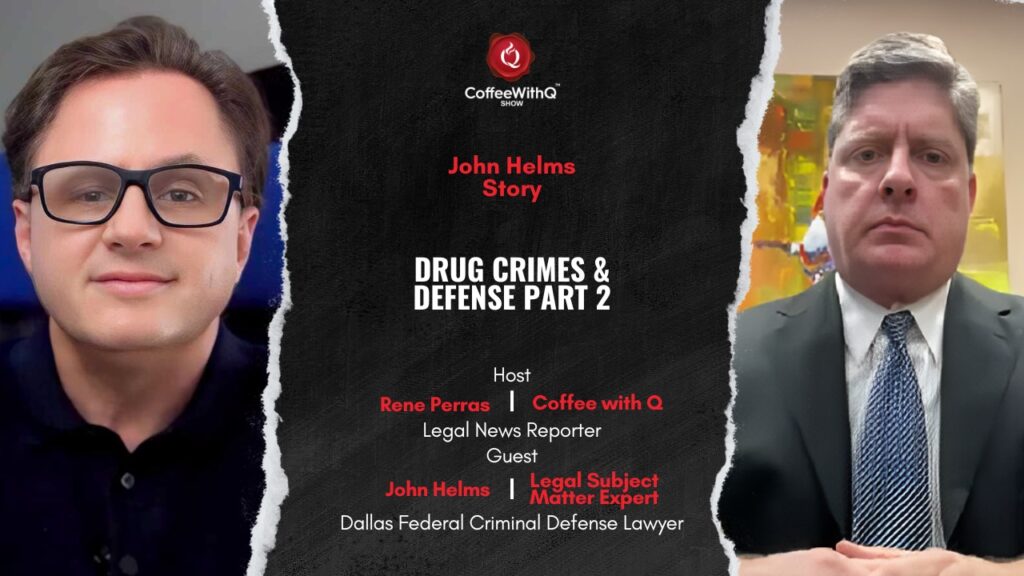Rene Perras Legal News Reporter & Technology Council for Coffee With Q:
Host: Renee Perras – Legal News Reporter
Guest: John Helms, Federal Drug Crimes Defense Lawyer in Dallas, TX
Episode Theme: Understanding the complexities of federal drug charges and how John Helms, a top defense lawyer in Dallas, helps clients navigate these serious cases.
Welcome back to Coffee with Q News, the podcast where we shed light on crucial legal matters. I’m your host, Renee Perras, and today, we are thrilled to have one of the best federal drug crimes defense attorneys in Dallas, John Helms, back with us. If you’re new to the show, John has over 30 years of legal experience, including his time as a federal prosecutor for the Northern District of Texas. Today’s episode is the second in our series on navigating the complexities of federal drug cases.
So, grab your coffee and settle in as we explore how John Helms tackles some of the toughest federal drug crimes in Texas.
Renee Perras: John, welcome back to the show! I know our listeners are eager to dive into today’s topic, federal drug crimes. You’ve built an impressive reputation in this field. Can you start by explaining what makes federal drug charges so different from state charges?
John Helms: Thanks for having me again, Renee! Yes, federal drug crimes are significantly different from state-level cases. These charges typically involve larger operations—often crossing state lines or even international borders—and are investigated by federal agencies like the DEA (Drug Enforcement Administration). Because of the larger scale, the penalties are much harsher under federal sentencing guidelines. Federal prosecutors are also relentless in their approach, which makes it critical to have an experienced attorney familiar with both defense and prosecution tactics.
Renee Perras: That’s a great point. So, when you’re defending a client against federal drug charges, what’s your first step? How do you build a defense?
John Helms: Every case is unique, but my approach usually starts with a thorough review of the details—how the arrest was made, what evidence the government has, and whether any constitutional violations occurred. For example, I often challenge the legality of search and seizure operations. If law enforcement obtained evidence through an unlawful search, we can sometimes get that evidence thrown out. It’s also important to examine any wiretaps or informant testimonies, which are common in federal cases. My experience as a former federal prosecutor gives me a deep understanding of how the government builds its case, allowing me to anticipate their strategies.
Renee Perras: That insider knowledge must be a huge advantage! What are some of the most common federal drug charges you see in Dallas?
John Helms: In Dallas and across the Northern District of Texas, we often see cases involving methamphetamine, heroin, cocaine, and more recently, fentanyl. These cases typically involve drug trafficking, possession with intent to distribute, manufacturing of controlled substances, and conspiracy to distribute. Methamphetamine, in particular, is a major problem, with a lot of it being smuggled into Texas from Mexico. The rise of fentanyl cases has also been concerning, given the drug’s potency and the severe penalties associated with its distribution.
Renee Perras: Fentanyl is certainly a hot topic, especially with the increase in overdose cases. How do you approach defending clients in cases involving fentanyl?
John Helms: Fentanyl cases are especially tricky because the drug is so potent and dangerous, and it’s often tied to larger trafficking networks. My approach is to thoroughly examine how the drugs were transported and whether my client was truly involved in the trafficking operation. Sometimes clients are wrongfully caught up in these operations, so it’s important to look at the role they played and whether the government can actually prove intent to distribute.
Renee Perras: That makes sense. It seems like federal cases are incredibly complex. You mentioned constitutional violations earlier. Can you give us an example of a situation where this could come into play in a drug case?
John Helms: Absolutely. Let’s say law enforcement conducted a search without a valid warrant or used improper surveillance methods. If that happens, any evidence they gather might be considered inadmissible in court. For example, I’ve had cases where we challenged the use of informants, especially if the informant had a questionable background or provided unreliable information that led to my client’s arrest. Protecting my clients’ constitutional rights is key in getting evidence thrown out and charges reduced.
Renee Perras: That sounds like a powerful defense strategy. You’ve successfully handled many high-profile cases over the years. Could you share an example of a particularly challenging federal drug case you worked on?
John Helms: One of the more complex cases I handled involved a conspiracy to distribute methamphetamine across state lines. The government had a lot of evidence, including wiretaps and testimony from informants. What made this case challenging was the sheer volume of surveillance data. However, by carefully reviewing all the wiretaps, we were able to find inconsistencies in the prosecution’s narrative. Ultimately, we were able to reduce the charges significantly, which saved my client from a lengthy prison sentence.
Renee Perras: Wow, that’s an incredible outcome! With your extensive experience as both a prosecutor and a defense attorney, you must have unique insights into how to win these tough cases. What would you say is your biggest advantage in the courtroom?
John Helms: I’d say my biggest advantage is understanding how the prosecution thinks. Having worked on the other side as a federal prosecutor, I know how the government builds its cases—what they focus on and where their weaknesses are. This allows me to construct a defense that can effectively counter their strategy. It’s not just about knowing the law, but also about anticipating the prosecution’s moves and staying one step ahead.
Renee Perras: That’s a great advantage to have! Before we wrap up, what advice would you give to someone who’s facing federal drug charges? What’s the first thing they should do?
John Helms: The first thing is to contact an experienced federal defense attorney as soon as possible. Federal cases move quickly, and early intervention can make all the difference. The government will already be building a case against you, so it’s critical to have someone on your side who understands how to defend against these serious charges. Time is of the essence when it comes to federal drug crimes, so don’t wait to get help.
Renee Perras: Great advice, John. And for anyone listening who might need legal help, how can they get in touch with you?
John Helms: They can reach me directly at 214-666-8010 or visit the website at www.johnhelms.attorney. We offer consultations and John is always ready to discuss how we can build a defense.
Renee Perras: Thank you so much, John, for sharing your expertise today. It’s always a pleasure having you on the show. For our listeners, if you or someone you know is facing federal drug charges, don’t wait—get in touch with John Helms. His experience and track record speak for themselves.
This has been Coffee with Q News, where we tackle important legal issues with experts who are making a difference. Thanks for tuning in, and we’ll see you next time!
Frequently Asked Questions (FAQs)
1. What makes federal drug charges different from state charges?
Federal charges typically involve larger-scale operations and carry more severe penalties due to stricter sentencing guidelines.
2. How can John Helms help in a federal drug case?
John Helms uses his experience as a former federal prosecutor to anticipate government strategies and build a strong defense, often challenging the legality of the evidence.
3. What are the most common federal drug crimes in Dallas?
The most common charges include trafficking methamphetamine, heroin, cocaine, and fentanyl, along with conspiracy to distribute.
4. Can a federal drug charge be dismissed?
Yes, with a strong defense that challenges the evidence or proves violations of constitutional rights, charges can be reduced or dismissed.
5. What is the punishment for federal drug crimes?
Punishments can range from several years in prison to life sentences, depending on the quantity of drugs and the defendant’s criminal history.
6. How soon should I contact a lawyer if charged with a federal drug crime?
Immediately. Early legal intervention is crucial for building a strong defense in federal drug cases.
Rene Perras covers: Legal News Reporting for Coffee With Q as a Technology Council, Legal Podcast, Legal News Insights, Legal Discussions, Technology and Law, Coffee With Q News, Law and Technology, Legal Expert Interviews, Legal News Platform, Law and Society, Legal Analysis, Law and Technology Council, Legal Reporting, Technology in Law, Legal Issues Podcast, Legal News Coverage.



